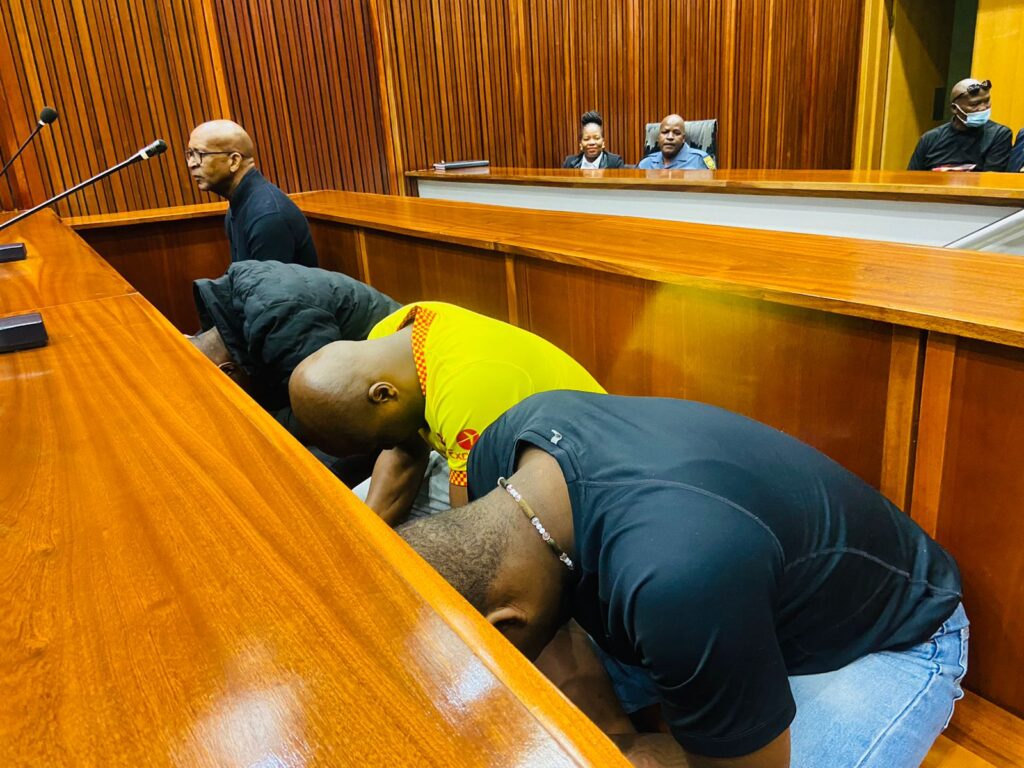
Stanley Leshabane and his co-accused were sentenced to two life sentences for conspiracy to murder and murder.
Stanley Leshabane from Bolobedu and his co-conspirators were last week handed two life sentences for the double murders of his estranged wife and her business partner.
Leshabane was found guilty of hiring four contract killers to murder his wife, Makoena Mabusela-Leshabane and her business partner-cum friend, Tebogo Mphuti.
The lengthy sentences relate to charges of conspiracy to commit murder and murder.
Delivering judgement in the Limpopo High Court sitting in Polokwane, Judge Geriet Muller emphasised the brutality in which the victims were murdered.
During the incident that happened on 10 October 2020 in the Polokwane industrial site, the two women were sprayed with a hail of bullets, killing them instantly.
The purported hitman, Ndondo Buthelezi was handed additional three years for possession of unlicensed firearm and ammunition.
It emerged during cross-examination during the protracted trial that Leshabane, who originates from Ga-Motupa village, hired Buthelezi, John Zulu, Bhekumuzi Phiyose, and Thembelani Dlamini to execute the killing.
Zulu died in 2023 while in custody.
Leshabane confirmed to have paid the hitmen R5 000 to follow his wife to Polokwane on her business trip and further promised to pay them R60 000 once the job was completed.
However, during mitigation, Leshabane stunned the packed courtroom when he said he feels to remorse because he had no role in the gruesome assassination of the two businesswomen.
Despite compelling evidence against him, Leshabane insisted that he had no involvement in the killings.
During the trial, there was a statement that contained bloodcurdling details on how Mabusela-Leshabane and Mphuti’s mafia-style executions were planned.
Leshabane said even though he had marital problems, he never felt the urge to end his wife’s life.
“I cannot feel remorseful for a crime I have no knowledge of. I feel pity for the death of the mother of my children but I was not involved in the crime” said Leshabane.
Muller said the killing of a human being is a serious offense and those found guilty of such a crime deserve a harsher sentence. He said “The sentence should serve as a deterrent for would-be murderers. I am handing over two life sentences to these men because they are a menace to society. As for their mitigation circumstances, citing poor health, the matter will be dealt with by the correctional services. Their murderous actions have robbed innocent children of their mothers and some villagers in Ga-Matlala have been deprived of a community builder as Mabusela-Leshabane was planning to build them a library. I am particularly concerned that none of them is remorseful and that their actions were motivated by greed.”
Leshabane’s step son, Ketetsi Leshabane confirmed that there were marital problems that forced his stepfather to leave their Midrand house.
When he took to the stand as state witness, a tearful Ketetsi said the family was dismayed by Leshabane’s lack of remorse.
“I really cannot fathom why my father is unable to own up to his wrongdoing. It is so hard for me that I have to explain this to my younger siblings. We are relieved now that the wrath of the law has taken its course” he said.
Ketetsi said the brutal murder of his mother did not only robbed the family of a selfless provider, but also local communities who lost a philanthropist.
Ketetsi said “My mother’s death has left a huge vacuum in many ways. For me and my teenage siblings, it is hard to bear. My younger sister and brother suffered post-traumatic stress disorder following this brutality. Even though they are receiving psychosocial support from social workers, they still miss our mother. I had to step up and assume the role of a parent at a time I too needed a mother.”
In an attempt to appeal for a lesser sentence, Muller dismissed their application, insisting that no other court will arrive at a deferent conclusion.
